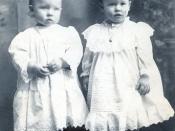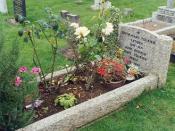Clive Staples "Jack" Lewis, formally known as C.S Lewis, was an atheist scholar who became an Anglican, a highly acclaimed apologist and a "patron saint" of Christians everywhere.
INTRODUCING: LEWIS
"He was a heavily built man who looked about forty, with a fleshy oval face and a ruddy complexion. His black hair had retreated from his forehead, which made him especially imposing. I knew nothing about him, except that he was the college English tutor. I did not know that he was the best lecturer in the department, nor had I read the only book that he had published under his own name1 (hardly anyone had). Even after I had been taught by him for three years, it never entered my mind that he would one day become an author whose books would sell at the rate of about two million copies a year. Since he never spoke of religion while I was a pupil, or until we had become friends fifteen years later, it would have seemed incredible that he would become the means of bringing many back to the Christian faith."
-George Sayer: biographer and long-time friend
Lewis was reared in a peculiarly bookish home in Belfast, Northern Ireland2 on November 29, 1898. The reality he found on the pages of the books within his parents' profligately extensive library seemed as tangible and meaningful to him as anything that transpired outside their doors. He and his older brother Warren were more at home in the world of ideas and books of the past, than with the material and technological world of the Twentieth Century.
Warren was sent off to English boarding school in 1905 and subsequently Lewis became reclusive, turning to seek solace in the imaginary worlds of dressed animals and knights in armour3. The tranquillity and...

![[Portrait of Dizzy Gillespie, John Lewis, Cecil Payne, Miles Davis, and Ray Brown, Downbeat, New York, N.Y., between 1946 and 1948] (LOC)](https://s.writework.com/uploads/7/70016/portrait-dizzy-gillespie-john-lewis-cecil-payne-miles-davis-thumb.jpg)

This is not an essay!
this is not an essay nor any thesis! it's some bulletted piece of shit!
5 out of 9 people found this comment useful.